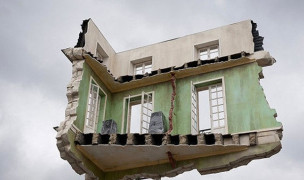 10 Terms
10 TermsHome > Terms > English (EN) > West
West
Comprehending the American West is a Herculean task. This essay will take the West to include the tier of Great Plains states from Texas to the Dakotas and everything westward, including Alaska and Hawai’i. This categorization easily makes the West the largest of America’s regions, comprising nineteen states and well over half the nation’s territory. This enormous and diverse area is in some views not a region at all, but a conglomeration of very different regions: the desert Southwest; the Pacific Northwest; the Great Plains; and the mountain interior. But the West offers unity as well as diversity.
What are the unifying characteristics of this vast region? Aridity is one widespread feature of a generally difficult, inhospitable climate. Most of the West is also relatively empty; the landscape is imposing, both in its grandeur and its harshness. The West is home to America’s oldest, largest and best-known national parks, and is the center of the nation’s tourism and recreation industries. The federal government owns and controls a large portion of Western land.
It is the most multicultural part of the country with the largest concentrations of Hispanic, Asian and Native Americans. Virtually all of America’s Indian reservations are located in the West. Surprisingly it is also the most urban region, with the highest percentage of its people living in cities.
A large part of what makes the West cohere is its history. For most Americans the West is defined primarily by its frontier heritage. The West is the land of explorers and fur trading “mountain men,” gold rushes and Indian conflicts, cowboys, overland trails and hardy pioneers. This “West of the imagination” became the focal point for an immense popular-culture industry incessantly portrayed in art and music, a vast literature and above all in movies and on television.
The contemporary West, then, combines mythological popular-culture nostalgia and modern reality. Nonetheless, change has come to the West in a particularly dramatic way in the past half century. For most of its history the West was in a subaltern position— politically economically and culturally dominated by the East. The Second World War was its watershed. With the growing importance of Asia and the Pacific Rim, the West became a central, and often even pace-setting region.
The growth, maturity and influence of the West in contemporary American culture can be traced in many areas. Politically the New Right, the main development in American politics since the decline of New Deal liberalism, is a Western phenomenon. Barry Goldwater, who began the movement, is from Arizona; Ronald Reagan, from California, was its culmination. Richard Nixon, a pivotal figure of recent American politics, was another Californian. Prior to the Second World War no American president had been from the West. Since the Second World War, only Kennedy, Carter and Clinton have not had western affiliations (and Kennedy ran with Lyndon Johnson).
The tilting of American political power westward was propelled by population shifts.
The West has been the most rapidly growing region in America for decades. California surpassed New York as the nation’s most populous state in the 1960s. Texas will soon rank second. Los Angeles recently overtook Chicago as the nation’s second-largest city and San Diego, San Antonio and Phoenix continue to push upwards.
Economically since the Second World War, the West has left behind its colonial status as a plundered province. Three Pacific wars—the Second World War, Korea and Vietnam—promoted westward shifts in military spending and the defense industry. A highly symbiotic relationship exists between the West, the military and America’s emergence as a global superpower, as San Diego and Seattle attest.
Moreover, America’s military might was closely tied to “big science.” Again the West played a prominent role: from Berkeley to Los Alamos and Alamagordo to Silicon Valley, it has been a twentieth-century laboratory. In addition, the West is America’s main energy producer. During energy shortages in the 1970s and 1980s, energy-oriented cities like Denver and Houston boomed.
The West is now arguably the nation’s cultural leader. Even in the 1920s and 1930s, Hollywood was a major shaper and exporter of American culture, and California was already pioneering lifestyles that would become standard nationwide after the Second World War. Disneyland is an American and global cultural icon, as is Las Vegas. The counterculture of the 1960s originated in the San Francisco Bay area, and influential American rock music, from the Beach Boys to the Doors to acid rock, came from California. In the 1990s, Seattle has been the home of alternative rock and grunge lifestyles. From the popularity of sun tanning and outdoor barbequing to the television programs Dallas and Baywatch, from Pacific Northwest or “cowboy chic” influences in fashion to California, Tex-Mex and Southwest cuisine, the West has set the standards for American popular culture in recent decades.
At the same time, America’s growing environmentalism also has Western roots.
Environmental symbols, including the wolf, the buffalo, the grizzly bear, the redwood and the spotted owl, are mostly Western. America’s leading environmental advocates have come from the West and crucial environmental battles have taken place there.
The West has been one of the most dynamic regions of the country in the past half century. Its vitality is reflected in a lively and widely varied Western regionalism.
Examples include the flourishing of Western literature, especially Hispanic, Native and Asian American variations; the New West History; a resurgent popularity of country and western music; influential Southwestern and postmodern architecture and interior design; and Western art and photography. All of these factors make the West arguably the most intriguing and important of the nation’s regions. Americans have always been fascinated with the historic West. Now the contemporary West is at the center of attention too.
- Part of Speech: noun
- Synonym(s):
- Blossary:
- Industry/Domain: Culture
- Category: American culture
- Company: Routledge
- Product:
- Acronym-Abbreviation:
Other Languages:
Member comments
Terms in the News
Billy Morgan
Sports; Snowboarding
The British snowboarder Billy Morgan has landed the sport’s first ever 1800 quadruple cork. The rider, who represented Great Britain in the 2014 Winter Olympics in Sochi, was in Livigno, Italy, when he achieved the man-oeuvre. It involves flipping four times, while body also spins with five complete rotations on a sideways or downward-facing axis. The trick ...
Marzieh Afkham
Broadcasting & receiving; News
Marzieh Afkham, who is the country’s first foreign ministry spokeswoman, will head a mission in east Asia, the state news agency reported. It is not clear to which country she will be posted as her appointment has yet to be announced officially. Afkham will only be the second female ambassador Iran has had. Under the last shah’s rule, Mehrangiz Dolatshahi, a ...
Weekly Packet
Language; Online services; Slang; Internet
Weekly Packet or "Paquete Semanal" as it is known in Cuba is a term used by Cubans to describe the information that is gathered from the internet outside of Cuba and saved onto hard drives to be transported into Cuba itself. Weekly Packets are then sold to Cuban's without internet access, allowing them to obtain information just days - and sometimes hours - after it ...
Asian Infrastructure Investment Bank (AIIB)
Banking; Investment banking
The Asian Infrastructure Investment Bank (AIIB) is an international financial institution established to address the need in Asia for infrastructure development. According to the Asian Development Bank, Asia needs $800 billion each year for roads, ports, power plants or other infrastructure projects before 2020. Originally proposed by China in 2013, a signing ...
Spartan
Online services; Internet
Spartan is the codename given to the new Microsoft Windows 10 browser that will replace Microsoft Windows Internet Explorer. The new browser will be built from the ground up and disregard any code from the IE platform. It has a new rendering engine that is built to be compatible with how the web is written today. The name Spartan is named after the ...
Featured Terms
Lapping
An abrasive process that removes the last bit of unwanted material. A lapping process sometimes uses an abrasive paste that is rubbed across the part ...
Contributor
Featured blossaries
Marouane937
0
Terms
58
Blossaries
3
Followers
10 Architectural Structures that Nearly Defy Gravity
 10 Terms
10 Terms
Browers Terms By Category
- Air conditioners(327)
- Water heaters(114)
- Washing machines & dryers(69)
- Vacuum cleaners(64)
- Coffee makers(41)
- Cooking appliances(5)
Household appliances(624) Terms
- Bridge(5007)
- Plumbing(1082)
- Carpentry(559)
- Architecture(556)
- Flooring(503)
- Home remodeling(421)
Construction(10757) Terms
- Physical geography(2496)
- Geography(671)
- Cities & towns(554)
- Countries & Territories(515)
- Capitals(283)
- Human geography(103)
Geography(4630) Terms
- Biochemistry(4818)
- Genetic engineering(2618)
- Biomedical(4)
- Green biotechnology(4)
- Blue biotechnology(1)
Biotechnology(7445) Terms
- Economics(2399)
- International economics(1257)
- International trade(355)
- Forex(77)
- Ecommerce(21)
- Economic standardization(2)




